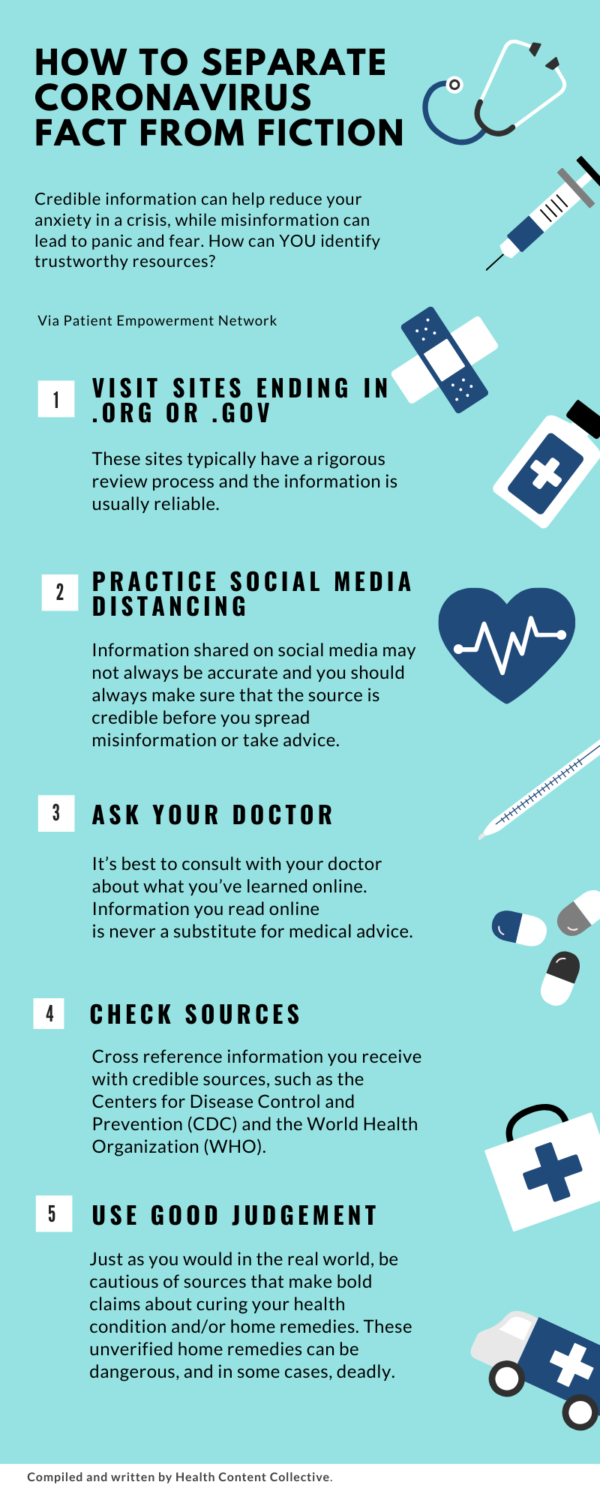How to Separate Coronavirus Fact from Fiction
The coronavirus (COVID-19) has officially been declared a pandemic by the World Health Organization (WHO) and it has created a frenzy of information. Details about the virus are spreading rapidly from every news outlet and are being discussed worldwide.
Misinformation can lead to panic and fear, while credible information can help allay your fears. But, how can you identify trustworthy information? Let’s review steps to recognize quality sources to help reduce anxiety during this confusing time.
The Problem? Too Much Information Spreading Too Quickly.
Referred to as an “infodemic” by the World Health Organization, it is an over-abundance of information – some accurate and some not – that makes it hard for people to find trustworthy sources and reliable guidance when they need it.
Basic Tips on Identifying Credible Information:
Visit Sites Ending in .org or .gov: These sites typically have a rigorous review process and the information is usually reliable.
.org usually indicates that this is a non-profit organization or advocacy group
.gov indicates that the website is a government organization
Practice Social Media Distancing: Information shared on social media may not always be accurate and you should always make sure that the source is credible before you spread misinformation or take advice.
Ask Your Doctor: It’s best to consult with your doctor about what you’ve learned online. Information you read online is never a substitute for medical advice.
Check Sources: Cross-reference information you receive with credible sources, such as the Centers for Disease Control and Prevention (CDC) and the World Health Organization (WHO).
Be leery of the information found on opinion-based websites, especially ones that don’t cite the sources of its information.
Use Good Judgement: Just as you would in the real world, be cautious of sites making bold claims about curing your health condition and/or sharing home remedies. These unverified home remedies can be dangerous, and in some cases, deadly.
What sources can you trust?
The National Institutes of Health (NIH) and the World Health Organization (WHO) are trusted sources, providing in-depth and more global information about the virus.
Visit your medical center website to stay informed about their procedures and how it may affect your care.
Use your patient portal to communicate with your medical team.
Well-established medical centers have created information pages with details specific to cancer patients.
Visit the Moffitt Cancer Center website to review their information on protecting against Coronavirus, particularly the section called “I have cancer. Am I at increased risk of contracting COVID-19?”
MD Anderson Cancer Center has detailed information about Coronavirus precautions, including a Frequently-Asked-Questions (FAQ) guide.
Have Questions for Your Doctor? Missing an Appointment? Consider Telemedicine.
Telemedicine is the practice of medicine via technology to get care from a distance. Your healthcare professional can be in one location and use a video-chat technology (i.e. Skype, Zoom, etc.) to deliver care remotely. Given these uncertain times, more medical centers maybe offering this option to prevent further spread of the virus. The benefits of a virtual office visit include:
Patients can receive guidance about whether they need to be seen or tested instead of showing up unannounced at an emergency room or doctor’s office.
Those that are high risk for a serious illness can choose to visit the doctor virtually for a routine check in with a specialist or a primary care doctor.
Avoiding crowded waiting rooms and the risk for infection.
To see what’s available to you, reach out to your doctor either via your Patient Portal or phone and follow your medical center closely via the web or social media. It’s likely they will be working to raise awareness of this option when it becomes available to patients. The bottom line: if you can avoid visiting an emergency room or hospital, take advantage.
Protect Yourself and Others
There are many tried and true methods for preventing the spread and contraction of illness, such as washing your hands often, avoiding touching your face, and keeping frequently touched surfaces disinfected. For more tips and details on prevention, visit the CDC Website here: https://www.cdc.gov/coronavirus/2019-ncov/about/prevention.html.

